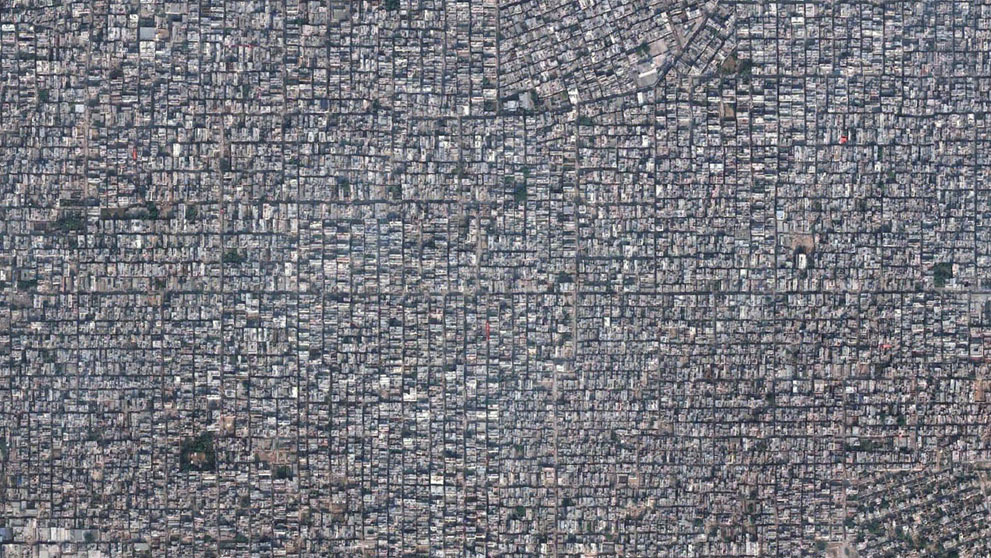
Today is the day that the United Nations Population Fund estimates that the world’s population will reach 7 billion people.
So, I’ve been thinking quite a bit about this particular moment in our history. As ever, it’s important to dig just a little below the surface to figure out what’s going on with the media’s coverage of this day. I’ve seen many slide shows in the past few months. I’ve seen many photos of crowded buses and streets in India and China. And photos of what look like very old people. All of these photos are, by turns, mesmerizing and heartbreaking.
Some facts: 200 years ago, there were only 1 billion people on the planet, and over the next 150 years, that number grew to 3 billion. Notably, in 50 years, the global population has more than doubled, and the UN projects that it could possibly grow to 15 billion by the year 2100.
The narrative that emerges from these kinds of stats pits humans (only some, however) against the environment. There is an alarmism that’s been on a long slow creep. An alarmism that tells us to worry about enough food, enough clean water, non-polluted air, and space enough for all of us. Not to mention the undercurrents of fear of the “browning” of the planet. A planet in which the growing population of people of color threatens our safety. A planet in which there aren’t enough resources for the West because of all the people in the East.
I’d like to take this moment to bust some of those myths and alarmist tropes.
First, let’s not get it twisted. It’s over-consumption, largely by the West generally, and the United States specifically, that is the greatest culprit in environmental degredation. The US is the largest emitter of greenhouse gases. Here, we consume the most water and energy.
Second, population growth has actually slowed in the past few decades. Seriously.

Third, this kind of uncritical alarmism is very destructive. Negative media images are rampant; hungry African children, masses of poor people in the third world, photos of pregnant women of color. These kinds of messages reiterate the idea that the danger of overpopulation is “over there” and that ‘those people’ outnumber ‘us. This fear often translates into xenophobic immigration policies and fear of increasing immigration to the West.
Fourth, poor women often bear the the burden of this kind of reckless rhetoric. They face unwanted sterilization and population control tactics. They often face the kinds of population control that programs distort family planning and diminish their control.
As we see, this is no small issue. There are many more reasons to be critical of the overpopulation narrative, and I presume we’ll see a lot of articles about this in the next few days. But I thought I’d just welcome the 7 billionth little sweet pea into the world with a little more truth and a little less alarmism.

i ran this story in my show this morning…
what baffled me is the stat that it takes 2000 gallons of water to make one pair of jeans. for 7 billion people to have one pair of jeans that takes 14 trillion gallons of water. Now we in the U.S. have more than one pair of jeans. i just bought two new pair this weekend so overconsumption is definitely an issue but with so many global warming deniers and people that think the environment will automatically and immediately renew itself we have a bigger problem than just overconsumption.
there needs to be a complete ideological shift so that people understand that with every new baby born (51 babies are born in India every minute making it the fastest growing country in the world) there will be a negative consequence to our Earth unless we drastically change our habits.
Eesha: thank you for this article. Its always so important (and so hard) to deconstruct the myths of “overpopulation” and call out who these conversations implicitly name as bearing this burden-global south women, poor women, women of color
Nikesha: I definitely agree that there needs to be a complete ideological shift. I just dont think that equating childbirth with environmental degradation is the way to go. To use your example about jeans, the problem is the way goods are produced, not that India is a large country, but those are often equated (as if India is the largest jean market, when really, its the West, especially the USA).
When these two are equated, the real culprits are left out- the exploitation of the global south, that a few people and corporations control most of the modes of production, etc, etc….the links eesha has in her article are WAY more articulate than I can be in these comments.
Eesha: thank you again for keeping our minds sharp and open!!
P.S. Im also curious as to how the gist of your article relates to the current hot topic in the USA: “food justice”….to me, its more about food sovereignty, which is rooted in the global south and intimately connected to owning land and controlling food markers
Mandisa! Thanks for this comment.
I want to reiterate the point that we have to re-think the way we consider WHO is considered a threat to our environment. While there more be more people in India and China, the US is actually the worst culprit of environmental degradation. So, when we say that the problem is the birth of babies in some parts of the world, we actually skew the truth. Because, as far as I understand, its not the people that are really the problem. Instead, it’s environmental destruction, as perpetuated by corporations and many Western nations, alongside militarism and an unregulated global market.
As for food justice. I think it’s a great question. I don’t know the nuances of these connections other than the points that you make about access to land and economic justice. I’ll dig around and share anything I find!
Hi – I looked for a way to send this privately & couldn’t find one. The sentence below has 2 pretty signficant typos in it & I thought you’d want to know:
“They face unwanted streilizations and populatation control tactics”
Thank you for a great article.
Got ’em. Thanks!
Thank you. This opened my mind and surprised me, though it makes perfect sense if I’d have taken the time to think about it for two seconds.
Also great timing since the insane consumer shopping season is about to start in the USA. And so I thank you again. For some of us, Halloween (Samhain) is the ‘New Year’ and I hope to turn my ways & habits (of consumption) around in the new year.
I really like the connections this post and the links makes to the injustices done in the name of overpopulation. It definitely does continue to marginalize and exploit the global south. I suspect (though I am not qualified or necessarily informed) that the disproportionate material demands and short-sighted manufacturing strategies of the West are a significant strain on world ecology. It is important to point out that disproportionate control of arable land by the economically privileged can prevent us from realizing ultimate agricultural production. In light of these factors, we do need to reconstruct global conception of population environmental impact in a way that does not contribute to exploitation.
But just because “global food production has consistently outpaced population growth” does not mean it will always be able to. We are still part of a system with scarcity. We may eventually encounter the material limits.
The justice question raised by this article is something like “why aren’t we stopping this exploitation?”
The philosophical/moral questions raised by the threat of potential overpopulation are something like “Do we choose more humans or a more environmentally straining way of life?” (assuming a finite resource can only be directed one of two ways) and, since population is ultimately a strain on the planet “Is it a human right to procreate?”
I think thats the point of Eesha’s powerful article, tho-the human versus environment conversation needs to be deleted from our political framework. Again, Eesha, thank you for this timely topic. Because the central theme of the argument I feel you, John Hoffman, are making is that certain humans are degradating the earth. I just dont think that is a liberatory framework because it derails from the real culprits. Because even though you seem to get that the West and Multi-national corporations have been dodging accountability for centuries now, Im not sure of how viable the scarcity framework is-especially when put in terms of your philosophical/moral question, which feels to me like a really disturbing dichotomy-“do we choose more humans or a more environmentally straining way of life?” I feel like this framework still blames certain groups of people and buys into the overpopulation myth, which is overwhelmingly harmful to women, especially women of color in the global south who are blamed for “having too many babies”
I wonder if a better philosophical, moral, and justice questions we could ask is “how to support the humans we have, centering those most vulnerable to exploitative and blaming economic policies and regulations?”-Consciously and holistically answering this question requires addressing environmental degradation and exploitation, as well as other issues.
We agree that scarcity and the framework of overpopulation framed in the media has massive negative effects and should not play a part in politics.
My question was short-sighted and misplaced in the sense that it reduces difference in an environment designed to recognize it.
My interest is what conceptions of human rights can enable justice when as far as we know we are working in a system with scarcity.
“This fear often translates into xenophobic immigration policies and fear of increasing immigration to the West.” And that is EXACTLY what it is: F.alse E.vidence A.ppearing R.eal.
On the other hand though, I do agree with most of the commentary posted: WE MUST have a shift in paradigm, complete with the discussion about what it means to be privileged to bear children. For the sake of social services, distribution of resources and mental health and sanity, there must be an on-going effort to educate the masses about what it means to responsibly bear progeny and how we are to be in the business of building children & not repairing them as adults.
Thanks for the insight Crunk-Sistah.
I appreciate the attention the author pays to the growing burden that people of color around the globe carry when it comes to population “alarmism.” Systemic economic inequality, the harsh treatment of women in relationship to reproductive questions, and racism get submerged when these alarmist tenets take center stage.
What we also have to take seriously is the question of exactly how, since 1950, has our population tripled? Oil has made it possible for such a population increase & we all know that oil is not a renewal resource. So, if oil has made such a population increase possible, what is going to happen when it runs out, especially given the fact that peak oil is either here or very near? This is a serious question that we must consider.
Good post.